SWAT Training
SWAT (Special Weapons and Tactics) units are teams of specially trained police officers who respond to extremely dangerous situations, such as hostage situations and high-risk entries. SWAT team training is intensive. Officers assigned to SWAT units are normally combat trained, extremely proficient with firearms, and in excellent physical condition.
Many police department SWAT teams are comprised of volunteers from both patrol and detective divisions. To receive one of the coveted SWAT positions, officers are usually required to submit a written application along with a letter of recommendation from their immediate supervisor. The applicant must also maintain an average firearms score of between 80 and 90 percent. Once accepted, the officer must average a score of 90 percent or higher.
SWAT standards were established in 1983 by the LAPD.
SWAT teams are required to attend annual training and regular practice. Some of their training includes:
Basic training
Learning the basics of SWAT, and how SWAT teams originated.
Tactical firearms course – Officers fire individually and then with a group. Then, they’re given one on one instruction before they fire again, individually. An officer’s score normally improve greatly after this intensive training session.
SWAT officers practice timed shooting, shooting while running, walking, and standing, and they practice reloading under fire.
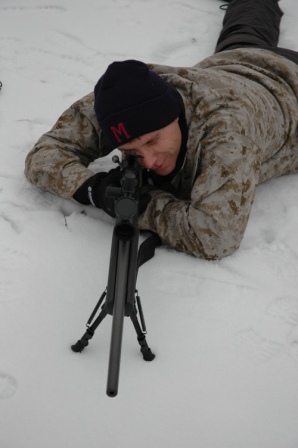
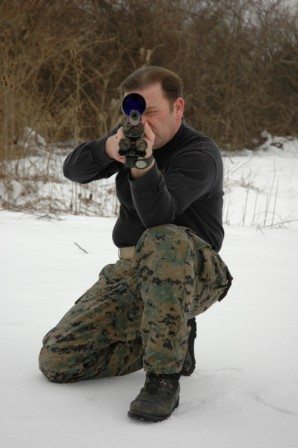
They’re also schooled in:
Search warrant executions
Obstacle course
Building entry and clearing
Dynamic entry
Mock exercises/realistic scenarios

Advanced and in-service training courses (partial list)
Covert operations
Counterterrorism
Knife fighting
Ground fighting
Stick fighting
Booby trap and explosive recognition
Hostage negotiation
Hazardous materials
(Thanks to the Hamilton Ohio Police Department SWAT Unit)
* * *
For Bobby M. (See comment below).



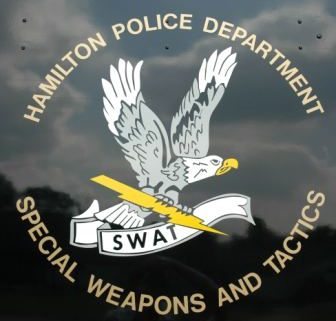


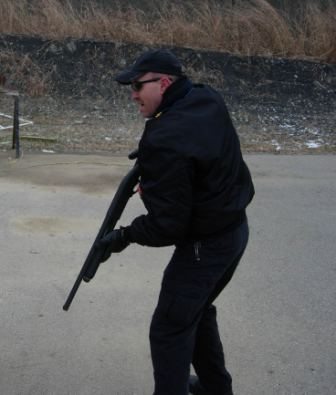
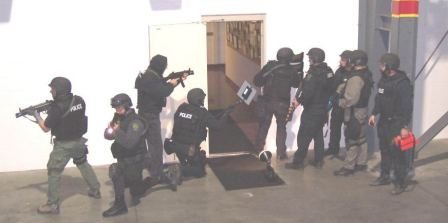




Late getting to the posts. When I was in our local Civilian Police Academy, we learned that the SWAT team has something like 4 full time members, and they’re the commanders. The rest of the teams pull normal deputy sheriff duty until they get a SWAT callout. The part that really shocked me was that they get a very trivial bonus to their standard pay — something like $13 a week, and it’s exactly the same as ALL special duty divisions, which includes things like the honor guard.
Peg – Where have you been? Your sarcasm has been greatly missed. Oh, I’m the guilty party who butchered the photo.
Elena – You’re too kind.
I’m sorry Lee, good ol’ Burl doesn’t begin to have your adorable good looks 🙂
Very interesting!
As for the pictures and the song I now can’t get out of my head …excuse me while I pick myself up from the floor. It’s not going to be easy my sides hurt from laughing.
Hmmm, who cut your chin off Lee?
You’re a real riot, Bobby…
Um, wow. Soooo, are you on the left or right?
Linda – I know the feeling. I’ve been humming “Have a Holly Jolly Christmas” all morning. Thanks, Bobby.
Lee,
I see the resemblance, but the late Burl Ives did not have your adorable dimples.
Now, if I could just get the lyrics of “Silver and Gold” out of my mind!
Linda
Elena – Coincidence. I’ve seen a few women on SWAT and ERT teams. Not many, but they’re out there.
James Dean couldn’t make it, but I noticed (in conference photos) that with each passing year I’m beginning to bear a striking resemblance to one of Dean’s East of Eden co-stars, Burl Ives.
I’ve added a photo at the bottom of today’s blog. Sigh…
Very interesting – good stuff I didn’t know. In the little exposure I’ve had, I’ve never seen any women – coincidence or reality?
Lee,
very informative stuff. I’m sure this’ll come in handy soon.
By the way, How was East of Eden. Did James Dean show up at all? 🙂
Linda – I read your blog yesterday. Nice pictures, with the exception of the ones of me. Yuck, as always.
Will – Yes, the FBI has SWAT teams and I do believe each of the field offices across the country has one, or access to one nearby. Here’s a link to the FBI’s SWAT and ERT units in El Paso.
http://elpaso.fbi.gov/swatert.htm
Carla – Most SWAT team members work in other areas within their departments, such as patrol or investigations. They simply respond when needed, whether on or off duty. The SWAT team members in the photos above work in other areas of the Hamilton PD, with the exception of their lieutenant. This is definitely the norm throughout the country.
Thanks for posting this! It gave me some definite character inspiration!
Question: what does the SWAT team do when they’re not called to respond to a situation? Unless they’re in Detroit or Philadelphia, I can’t imagine there’s a constant need for a SWAT team’s talents. I imagine they spend a lot of time continuing their training and keeping their skills honed, but between emergencies, what else goes on? Is there someplace they all “go” while waiting for a call to come in?
Carla
Lee,
Great stuff, as usual.
I have a question. Does the FBI have Swat Teams, or the equivalent? If so, would you know the inside lingo used to reference them? Are there teams at each field office?
Lee,
Cool pix.
BTW, I posted my wrap up of the East of Eden Writers Conference on my blog yesterday. It has lots of pictures and several of them feature your furry mug.
Here’s the link:
http://tinyurl.com/56lzvg
I hope you had a nice and uneventful trip back home.
Linda